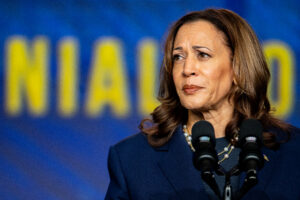
(Photo
by
Brandon
Bell/Getty
Images)
Watching
the
presidential
debate
last
week,
I
had
three
questions
in
my
mind:
Question
1:
Was
it
possible
for
Donald
Trump
to
prepare
properly?
Before
the
debate,
Trump’s
campaign
staff,
and
the
entire
sentient
western
world,
knew
that
Kamala
Harris
would
try
to
get
under
his
skin
during
the
debate.
To
prepare
for
that,
Trump
should
have
asked
someone
to
play
his
opponent
and
see
what
mock-Harris
could
do
to
get
under
Trump’s
skin.
This
would
have
given
Trump
a
chance
to
learn
how
to
ignore
the
needling.
During
preparation,
mock-Harris
would
have
said,
in
some
order:
-
Foreign
leaders
are
laughing
at
Trump. -
Unlike
Trump,
who
evaded
the
draft,
John
McCain
was
a
true
war
hero. -
Trump
lost
the
2020
election. -
Trump’s
basically
a
weak
guy
and
a
loser. -
As
juries
have
held,
Trump
has
committed
both
sexual
assault
and
multiple
felonies. -
Trump’s
rallies
are
boring,
and
people
walk
out
on
Trump. -
Probably
a
bunch
of
other
stuff.
That
would
have
been
great
preparation;
it’s
exactly
what
Trump
needed.
But
how
long
do
you
suppose
mock-Harris
would
have
remained
employed
by
the
Trump
campaign?
Even
though
mock-Harris
would
have
been
hired
to
do
exactly
what
I’ve
described,
I
bet
Trump
would
have
fired
mock-Harris
before
the
first
debate
prep
session
was
over.
I
don’t
think
Trump
can
take
this,
even
when
his
campaign
has
requested
it
and
it’s
for
his
own
good.
It
simply
wasn’t
possible
for
Trump
to
prepare
for
the
debate
with
Harris.
This
leads
to
Question
2:
Do
you
really
want
this
guy
to
be
president?
Setting:
The
Situation
Room
in
the
White
House.
Chairman
of
the
Joint
Chiefs
of
Staff:
“Mr.
President,
the
Russians
have
launched
a
surprise
nuclear
first
strike.
Russian
nuclear
missiles
are
heading
here
over
the
North
Pole.
Roughly
100
million
Americans
will
be
dead
in
seven
minutes.
Also,
the
Canadian
prime
minister
said
that
people
walk
out
of
your
campaign
rallies
because
you’re
boring.”
Trump:
“Quick!
Get
me
the
nuclear
codes!
We
have
to
nuke
Canada!”
I’m
not
afraid
of
the
phone
ringing
at
3
a.m.
and
Trump
having
to
field
an
emergency.
I’m
afraid
of
Trump
fielding
absolutely
any
situation
against
any
opponent
who
has
a
brain.
This
leads
to
Question
3:
How
do
you
judge
a
debate
when
you
already
have
strong
opinions
about
the
candidates?
I
hate
Trump.
I’m
embarrassed
to
live
in
a
country
where
apparently
roughly
half
of
us
are
conned
by
this
buffoon.
How
can
we
be
such
morons?
I
was
therefore
watching
the
debate
thinking,
“I’m
pretty
sure
Harris
is
cleaning
Trump’s
clock.
But
I
hate
Trump.
Perhaps
my
predispositions
bias
me.
What
would
a
neutral
person
think
of
what’s
going
on?”
After
the
debate,
I
checked
what
television
had
to
say.
In
the
spin
rooms,
the
Democrats
were
saying
that
Harris
won;
the
Republicans
were
saying
that
Trump
won.
Tim
Walz
and
Josh
Shapiro
said
Harris
kicked
Trump’s
ass.
Ted
Cruz
and
Marco
Rubio
said
Trump
kicked
Harris’
ass.
Why
do
we
bother
listening
to
what
those
clowns
have
to
say?
Rachel
Maddow
said
that
Harris
won
in
a
landslide.
Sean
Hannity
said
that
…
the
moderators
weren’t
fair.
Ha!
This
is
my
first
real
indication
that
Harris
won.
If
the
debate
were
even
close,
Hannity
would
be
saying
that
Trump
won;
instead,
he’s
whining
about
the
moderators.
Good
sign.
News
breaks
that
Harris
offered
Trump
a
rematch.
Democrats
say:
“See?
Harris
is
so
confident
that
she
can
beat
Trump
that
she’ll
do
it
again.”
Republicans
say:
“See?
It’s
like
pick-up
basketball.
If
you
lose,
you
immediately
ask
to
play
for
double
or
nothing.
This
proved
that
Trump
won.”
Both
arguments
are
plausible;
I
don’t
know
what
to
think.
Taylor
Swift
endorsed
Harris.
Democrats
say,
“We’re
delighted
to
have
the
support
of
this
cultural
icon.”
Republicans
say.
“Only
if
you
lose
do
you
ask
Taylor
Swift
to
give
an
endorsement
a
half
hour
after
a
debate.
This
was
meant
to
distract
attention
from
the
result
of
the
debate.”
Both
arguments
are
plausible;
I
don’t
know
what
to
think.
See?
When
you’re
infused
with
personal
bias,
there’s
nowhere
to
turn
for
a
neutral
assessment
of
a
debate.
I
next
looked
to
political
betting
markets,
where
people
actually
wager
money
on
who
they
think
will
win
an
election.
Betting
on
elections
is
illegal
in
the
United
States,
so
the
bettors
are
foreigners,
but,
within
minutes
after
the
debate,
the
betting
markets
are
saying
that
Harris
is
more
likely
to
win
the
election
than
she
was
before.
That’s
an
unbiased
data
point.
The
next
morning,
the
value
of
DJT
stock
—
stock
in
Trump’s
new
media
company
—
had
dropped
by
5%
or
10%.
Again,
that’s
real
people
—
this
time
including
Americans,
and
likely
including
many
Republicans
—
who
are
wagering
real
money
on
something
with
a
value
likely
to
rise
and
fall
along
with
Trump’s
fortunes.
If
DJT
stock
is
down,
then
Trump
lost.
Finally,
the
snap
polls
came
out.
They
say
Harris
won
overwhelmingly.
By
the
time
this
article
is
published,
actual
polls,
taken
after
the
debate,
are
likely
to
have
appeared.
At
that
point,
we’ll
really
know
the
truth.
That
leaves
only
my
last
questions
about
the
debate,
but
they’re
not
so
novel:
What
did
undecided
voters
think
about
the
debate,
and
will
the
debate
have
any
lasting
effect
on
the
race
for
president?
Mark Herrmann
spent
17
years
as
a
partner
at
a
leading
international
law
firm
and
later
oversaw
litigation,
compliance
and
employment
matters
at
a
large
international
company.
He
is
the
author
of
The
Curmudgeon’s
Guide
to
Practicing
Law and Drug
and
Device
Product
Liability
Litigation
Strategy (affiliate
links).
You
can
reach
him
by
email
at [email protected].

